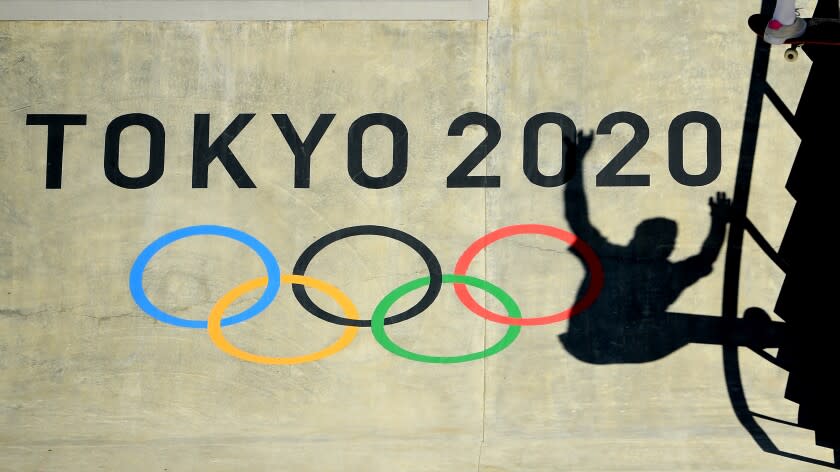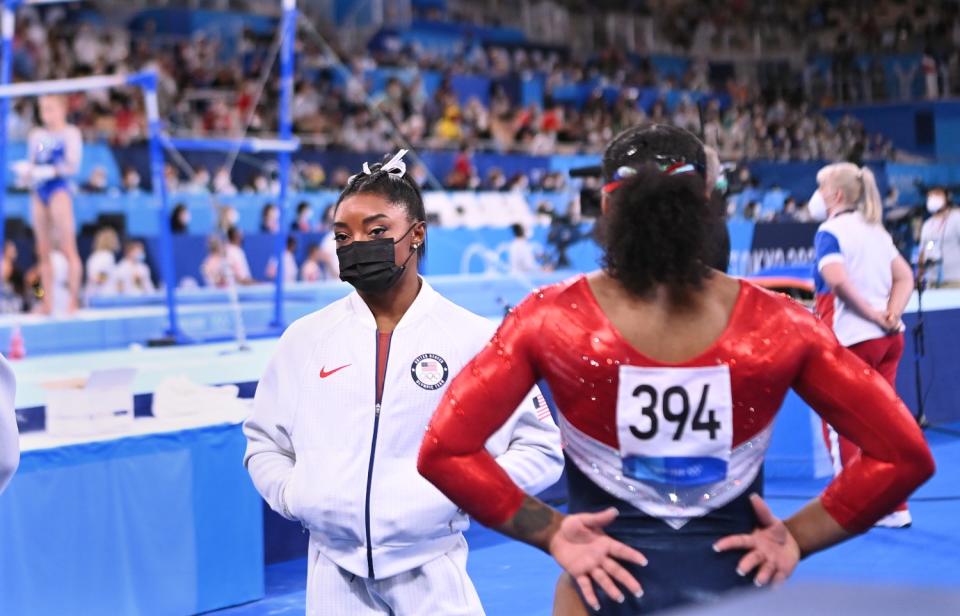Despite ratings woes, Tokyo Olympics will be profitable for NBCUniversal
- Oops!Something went wrong.Please try again later.

NBCUniversal acknowledged TV ratings for the Tokyo Olympics had been disappointing as the broadcaster grappled with a yearlong delay, the continuing coronavirus crisis, a brutal time difference and the unexpected exit of a star gymnast.
"We've had some bad luck," NBCUniversal Chief Executive Jeff Shell said Thursday during parent company Comcast's quarterly earnings call. "There was a drumbeat of negativity ... and that has resulted in linear ratings being probably less than what we expected."
Shell said, however, there were silver linings — primarily an Olympics lift for the company's year-old streaming service, Peacock, which is playing catchup with its more successful competitors, Netflix and Disney+.
Peacock benefited from a surge of new customers, which the company attributed to interest in the Olympics, the DreamWorks Animation movie "Boss Baby 2" and the original series "Doctor Death."
As of this week, more than 54 million households have signed up for the streaming service — a 25% increase compared with three months ago.
The ad-supported streaming service now has about 20 million monthly active accounts, Comcast said. That's up from about 14 million three months ago.
NBCUniversal had designed its Peacock launch to coincide with the Tokyo Olympics in July 2020 — but organizers delayed the Games a year due to the coronavirus. NBCUniversal went ahead with the service's national launch last summer but without a robust slate of original programming and without the Olympics.
"Peacock has been hanging out there without its big debut," said Dave Heger, a communications analyst with brokerage firm Edward Jones. "Hopefully, the Olympics will kickstart things for them. Now they have to keep up the momentum."
Despite the TV ratings woes, NBCUniversal remains in medal contention six days into the 17-day Tokyo Olympics competitions.
"With all this bad luck," Shell said, "we are going to be profitable on the Olympics — which we are very happy with."
During the earnings call, Shell alluded to the results of Thursday's gymnastics competition. An emerging American star from Minnesota, Sunisa Lee, won the gold medal for the women's all-round competition.
Shell said he hoped Lee's performance, which was covered live by CNBC, also would score ratings for NBC in prime time.
NBCUniversal is paying nearly $1.3 billion for the rights to broadcast the Tokyo Games, part of a long-term contract extension the company negotiated in 2014. At that time, NBCUniversal was intent on freezing out TV competitors that might be interested in bidding against NBCUniversal, which has broadcast the Olympics exclusively since CBS televised the Winter Olympics from Nagano, Japan, in 1998.
The current rights agreement, which covers TV and digital platforms, runs through the 2032 Games.
Overall, prime-time ratings for the Tokyo Olympics on NBC are down nearly 50% compared with the 2016 Olympics in Rio de Janeiro, according to Nielsen data. But there was less competition for viewers five years ago, and Brazil has a much more compatible time zone — one hour ahead of East Coast time.
In contrast, Tokyo is 13 hours ahead of New York and 16 hours ahead of Los Angeles.
"The online side of the business is helping to offset the challenges in traditional TV," Heger said.

The first night of competition on Saturday averaged 15.9 million viewers, down 32% from the comparable night of the Rio Summer Games in 2016. NBC’s audience rose to 20 million viewers on Sunday, which was down 36% from five years ago. Monday’s competition scored 16.8 million viewers, off 46% from the 31.5 million who watched on the comparable night in 2016.
The company stumbled by building much of its marketing campaign around star gymnast Simone Biles, who dominated the 2016 Rio Olympics but bowed out of the Tokyo competitions this week, citing the intense pressure and her mental health.
But the departure of Biles made room for Lee to shine.
Overall, Comcast had a strong second quarter, beating Wall Street's expectations.
The company gained 354,000 broadband internet subscribers. The company's broadband and cable TV business provides nearly three-quarters of the company's profits.
"Comcast’s broadband subscriber growth rate remains stratospheric, at 6.7% year-over-year," telecommunications analyst Craig Moffett wrote in a Thursday morning report.
For the quarter that ended June 30, Comcast generated $28.5 billion in revenue, up from $23.7 billion during the pandemic-hammered second quarter of 2020.
The company's adjusted net income increased 24.3% to $3.9 billion.
NBCUniversal posted nearly $8 billion in revenue for the quarter, an increase of 39% from the year-ago period when theme parks and movie theaters were shut down and live sporting events were canceled.
NBCUniversal's adjusted earnings before interest, taxes, depreciation and amortization, a metric used to measure profitability, increased 12.5% to $1.6 billion, which included financial losses at Peacock.
Times staff writer Stephen Battaglio contributed to this report.
This story originally appeared in Los Angeles Times.

